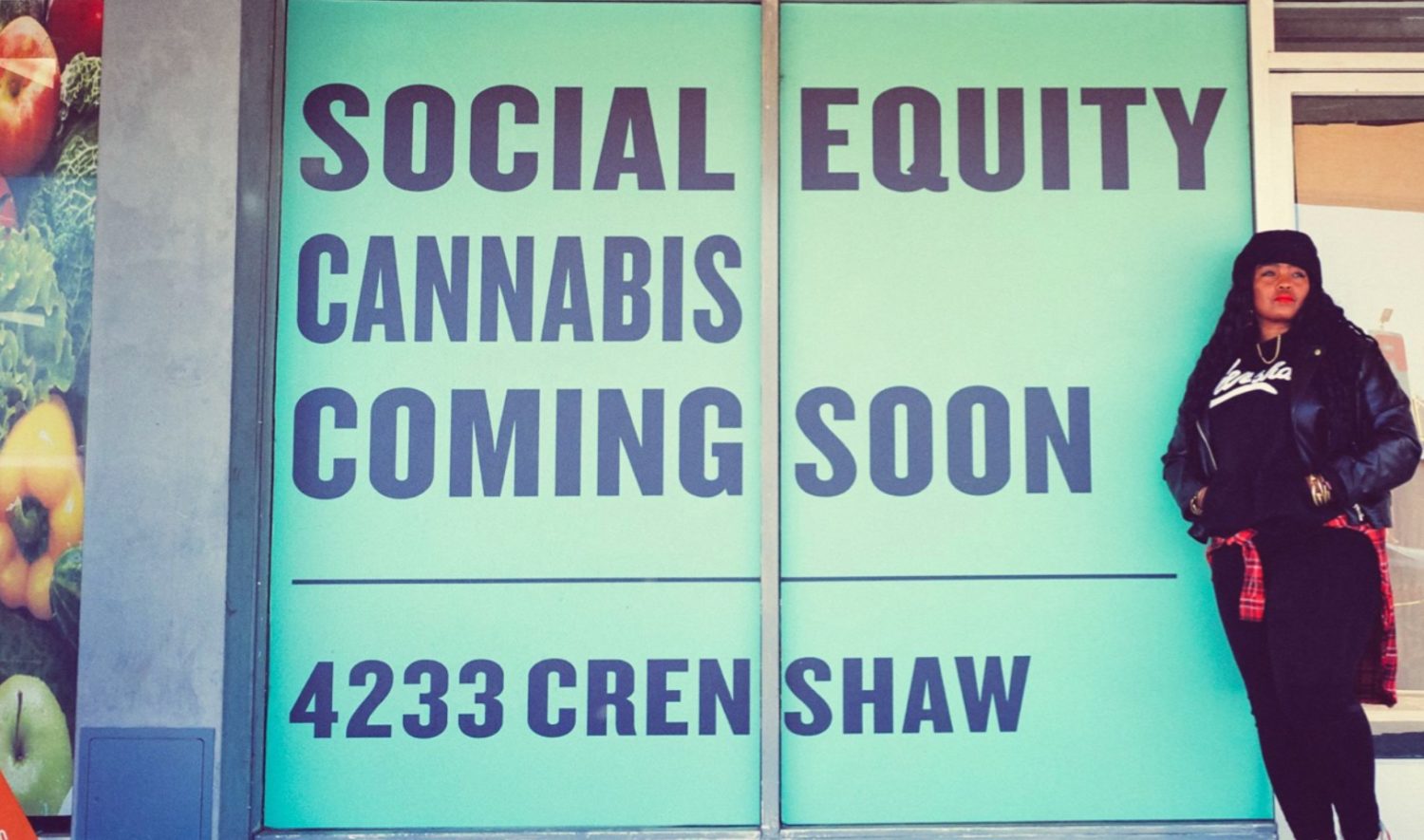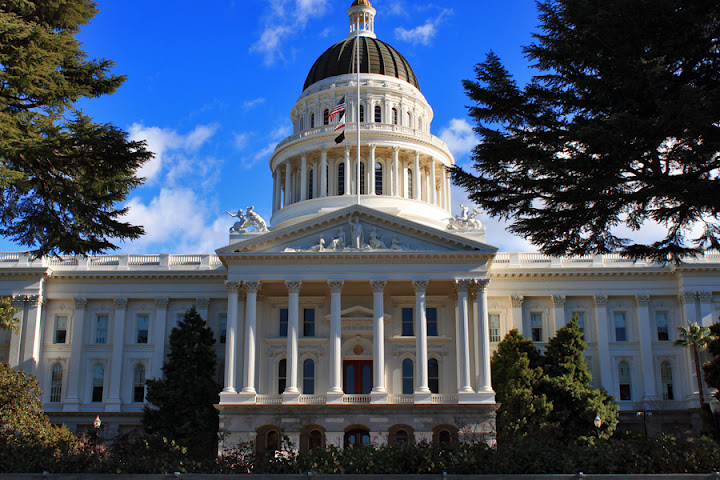The California Cannabis Equity Alliance rallied at the California State Capitol on Monday, calling into question the state’s commitment to properly executing the idea of social equity in the cannabis industry.
The equity rollout has faced the expected obstacles for a groundbreaking initiative, in addition to some more unexpected regulatory challenges. This week, advocates again explained their vision for economic justice and fairness in California’s marijuana industry and in the process raised their qualms about funding levels. Many also wondered, what happened to those precious dollars that were allocated to the cause?
State funding for enforcement is more than eight times what is being provided to communities hit the hardest by the War on Cannabis. That’s a big red flag for advocates.
L.A. local Kiki Keith was one of the leaders that spoke to the crowd. The president of the Social Equity Owners and Workers Association in L.A., Keith now finds herself working on the issue at the local, state and federal level. She was recently elected to serve on the board of the Minority of Cannabis Business Association where she’ll play a key role in how the conversations play out in the forthcoming national legalization debate.
As for Monday?
“It was good,” Keith told L.A Weekly. “Our message definitely reverberated through the halls. We were getting phone calls afterward. A lot of people were concerned that we would speak on a lawsuit against the state of California.”
Advocates have been sharing their frustrations with equity rollouts for years. We asked how long until things moved towards litigation? Keith said it looks like there will be a two-week period before the community takes action after having been pushed to its limit.
Keith had been dealing with rollout issues at every level. In L.A., she was part of the lawsuit that saw Los Angeles add 100 additional licenses. “We were able to further the dialogue in increasing the allocation, as a first step in building LA’s equity program. And we are not finished.”

Photo courtesy of Kika Keith
The most recent L.A. Social Equity happening was last week’s Spark session hosted by the Department of Cannabis Regulation. Keith called the latest effort to engage equity stakeholders political theatre.
“We’ve been up on public comments since 2017 for two minutes, right? They have record after record, letter after letter and we keep saying the same thing. Three years later, the first money that the city of L.A. spends for technical assistance is to do an outreach campaign? Where you only get two minutes to talk and they don’t even respond back to your questions? What the hell kind of spark is that?”
Keith argued it was just a bad attempt at getting engagement. Stakeholders get a comment session every month during the commission meetings. Keith finds the whole idea that advocates only get two minutes to speak their piece insulting, regardless of venue.
“And why do we only get two minutes to speak about what our solutions are? This isn’t a game,” Keith said. “These are people’s lives that are being affected and nobody is addressing this. You can’t tell me you hear me if you can’t respond to that. How do I know you listen and understand if you’re not responding back to me? That’s bullshit. That happens at public council meetings. That happens at the commission meetings. That happens at rules committee meetings. That happens at planning. Everybody just listens to you and nobody ever responds back in three years. Are you kidding me?”

Photo courtesy of Kika Keith
We asked if apart from money for licensees to execute, something like the SAFE Banking Act would be high on the list of priorities. Keith said with all the traditional struggles communities of color have faced in dealing with the financial sector, it’s hard to get excited about.
“Black and brown people get less than 5% of loans in the traditional loan market anyway,” Keith said. “You give us access to capital, access to the banks that don’t give us loans for non-cannabis. You think they’re going to give us loans for cannabis?”
Keith wants to see language around community development banks added to the SAFE Banking Act. “Where the government gets special funds so that if you have low credit ratings, if you don’t have collateral, then they still make these loans available to you. There’s tons of models of business development centers across this country, tons of neighborhood banks,” she said.
Keith truly believes that all these programs are designed to fail, that the big corporations hire their lobbyists that are behind the scenes working all of the politicians to create rules and regulations that have all the workarounds in their benefit.
“And even then, when they are in the social equity programs, month by month, year by year they’re dismantled. All the ordinances are changed at every City Council meeting, after everybody is all happy and excited by it,” she said.
But with all the momentum around social equity, surely those with the worst intentions can’t continue to move the pieces on the chessboard however they see fit. Days like Monday show how big an issue it’s becoming. The more time it spends in the spotlight, the longer people will think on who they should actually be listening to on the subject. We asked Keith how long until it will be difficult for people to operate under the cloak of fake equity.
“Not long. They didn’t expect this to be here today, and Monday was historical for the state of California,” Keith replied. “All of the other places nationally that have rolled out social equity, it has started at the state level, and then it’s trickled down to the local jurisdictions. That eliminated fracturing of the groups and organizations that were rallying behind these amendments.”
As California stakeholders continue to unify, they can only expect positive results. We asked Keith if the way the cannabis game was compartmentalized and cliqued up in L.A. ever made it tough to organize?
“Oh my gosh, yeah,” Keith replied. She said it made it particularly hard when regulators would say they were getting conflicting messages from various interests. “That was always their excuse to continue with their status quo. And to be honest with you, that’s why we banded together and formed the Social Equity Owners and Workers Association.” Another big reason was because social equity stakeholders actually taking part in the industry didn’t need anyone speaking for them, despite a number of Caucasian volunteers.
With funds being such a hot topic, Keith said the current plan by state Senator Steven Bradford in Sacramento to bump equity funding by $50 million would be a good show of faith from lawmakers and somewhere they can work forward from.
But she wants the money to go somewhere it will actually have an impact. She thought the idea of an equity oversight committee currently being tossed around in Sacramento was a good one.
“L.A. has gotten $10 million in three years and we have not gotten one penny. Not one social equity applicant has gotten one penny in grants or technical assistance from all of this money,” Keith said. “That needs to be reported. There needs to be accountability. When they start hearing this, then we work together. This is a new program. We understand that. This is a new industry, but we want to make sure that we’re at the table and that we’re heard and that we’re able to effectuate policy and it’s really simple. We just want to have fairness.”
Keith called the next few weeks, through June 15, critical. If you want to stay posted on the effort in Sacramento to reform social equity in the cannabis industry, text “EquityNow” to 55469.
Advertising disclosure: We may receive compensation for some of the links in our stories. Thank you for supporting LA Weekly and our advertisers.

